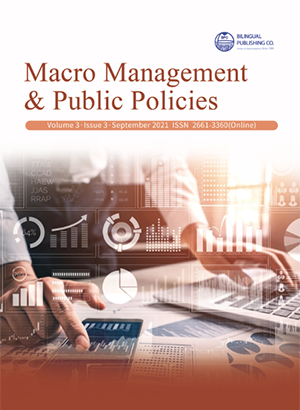-
1046
-
388
-
266
-
247
-
231
Effect of Donor Funding on the Performance of Water Utilities in Kenya
DOI:
https://doi.org/10.30564/mmpp.v3i3.3595Abstract
The objective of this study was to analyse the effect of donor funding on the performance of water utilities in Kenya. The study employed the use of a census by targeting all 88 regulated Water Services Providers (WSPs) in Kenya for a period of two years, 2016 and 2017. Data pertaining to the support received from the donors were obtained from the publications of the WSPs, Development Partners, Civil Society Organisations (CSOs), and Office of Auditor General (OAG). Performance data of the various WSPs were extracted from the Impact reports produced by Water Regulatory Board (WASREB), for the periods 2016/7 to 2017/8. Presentation of the data was done through the use of tables and charts with the application of SPSS. The study found that donor funding issued as Output Based Approach (OBA) leads to improved performance. This finding is expected to assist the Kenyan Government in negotiating for the Official Development Assistance (ODA) funding to be aligned to the government flagship projects under the Medium Term Plans (MTP). The study recommends OBA as the best way of issuing donor funding.Keywords:
Official development assistance; Water service providers; Kenya vision 2030; Sustainable development goals; Donor fundingReferences
[1] United Nations. (2015). Transforming Our World: The 2030 Agenda for Sustainable Development. New York: UN Publishing.
[2] WHO. (2018). Fact Sheets: Millennium Development Goals (MDGs). World Health Organization. https://www.who.int/news-room/fact-sheets/detail/millennium-development-goals-(MDGs)
[3] Government of Kenya. (2010). The Constitution of Kenya. Nairobi: Government Printer.
[4] Government of Kenya. (2016). Water Act, 2016 (No. 43 of 2016). Nairobi: Government Printer.
[5] WASREB (2018). A Performance Report of Kenya’s Water Services Sector 2015/16 and 2016/17. Impact Issue No. 10.
[6] OECD (2018). Development Co-operation Report 2018: Joining forces to leave no one behind. Secretary-General of the OECD Report, Paris.
[7] GIZ. (2019). “Access to Water and Sanitation in Sub-Saharan Africa.” Briefing Document. GIZ. https://www.oecd.org/water/GIZ_2018_Access_Study_Part%20II_Narrative%20Report_Briefing_document.pdf
[8] Baran, P. (1957).The political economy of growth. New York: Monthly Review Press.
[9] Romaniuk, S.N. (2017). Dependency Theory. In: P. Joseph, ed. The SAGE Encyclopedia of War: Social Science Perspectives. Thousand Oaks: SAGE.
[10] Ekeh, J., & Emeh, E. (2013). Dependency Theory and Africa’s Underdevelopment: A paradigm shift from Pseudo-Intellectualism (The Nigerian Perspective). In International Journal of African and Asian Studies. 1, 116-128.
[11] Jackson, J., Nkwocha, I., & Boroh, S. (2016). Dependency and Third World Underdevelopment: Examining Production-Consumption Disarticulation in Nigeria. African Research Review, 10(5), 44. DOI: http://doi.org/10.4314/afrrev.v10i4.15
[12] World Bank. (2020). The African Continental Free Trade Area: Economic and Distributional Effects. Washington, DC: World Bank.
[13] Ahiakpor, J. (1985). The success and failure of dependency theory: the experience of Ghana. International Organization, Cambridge University Press, 39(3), 535-552.
[14] Ahsan, K., & Gunawan, I. (2010). Analysis of cost and schedule performance of international development projects. International Journal of Project Management, 28(1), 68-78.
[15] OECD. (2005). The Paris Declaration on Aid Effectiveness. OECD. March 2, 2005.
[16] Beamon, B., & Balcik, B. (2008). Performance measure in humanitarian relief chains. International Journal of Public Sector Management, 21 (1), 4-25. DOI: http://doi.org/10.1108/09513550810846087
[17] Galvin, M., & Habib, A., (2003). The Politics of Decentralisation and Donor Funding in South Africa's Rural Water Sector. Journal of Southern African Studies, 29(4), 865-84.
[18] WSP (2004). Sector Finance and Resource Flows for water supply: A pilot application for Kenya. Executive summary, sector financing papers.
[19] WSTF (2018). Result Based Financing for Water Services Providers in Kenya. Water Fund financing the Water Sector. WSTF.
[20] WASPA (2018). Advocating for Quality Water Services: Strategic Plan 2018-2022. Supported by SNV.
[21] Waweru, P., & Fatoki, O. I. (2021). GDP-Indexed bond and budget financing options in Kenya. International Journal of Innovative Research in Accounting and Sustainability (IJRAS/AAUA) 6(1), 221-248. https://ijiras.org
[22] Gujarati, D. N. (2013). Basic econometrics, (5th ed.). New York: The McGraw-Hill Companies.
[23] Newbert, S. (2008). Value, Rareness, Competitive Advantage and Performance: A Conceptual-Level Empirical Investigation of the Resourced-Based View of the Firm. Strategic Management Journal, 29 (1), 745-768. DOI: https://doi.org/10.1002/smj.686
Downloads
How to Cite
Issue
Article Type
License
Copyright © 2021 Author(s)

This is an open access article under the Creative Commons Attribution-NonCommercial 4.0 International (CC BY-NC 4.0) License.




 Nicholas Daniel Otieno
Nicholas Daniel Otieno

